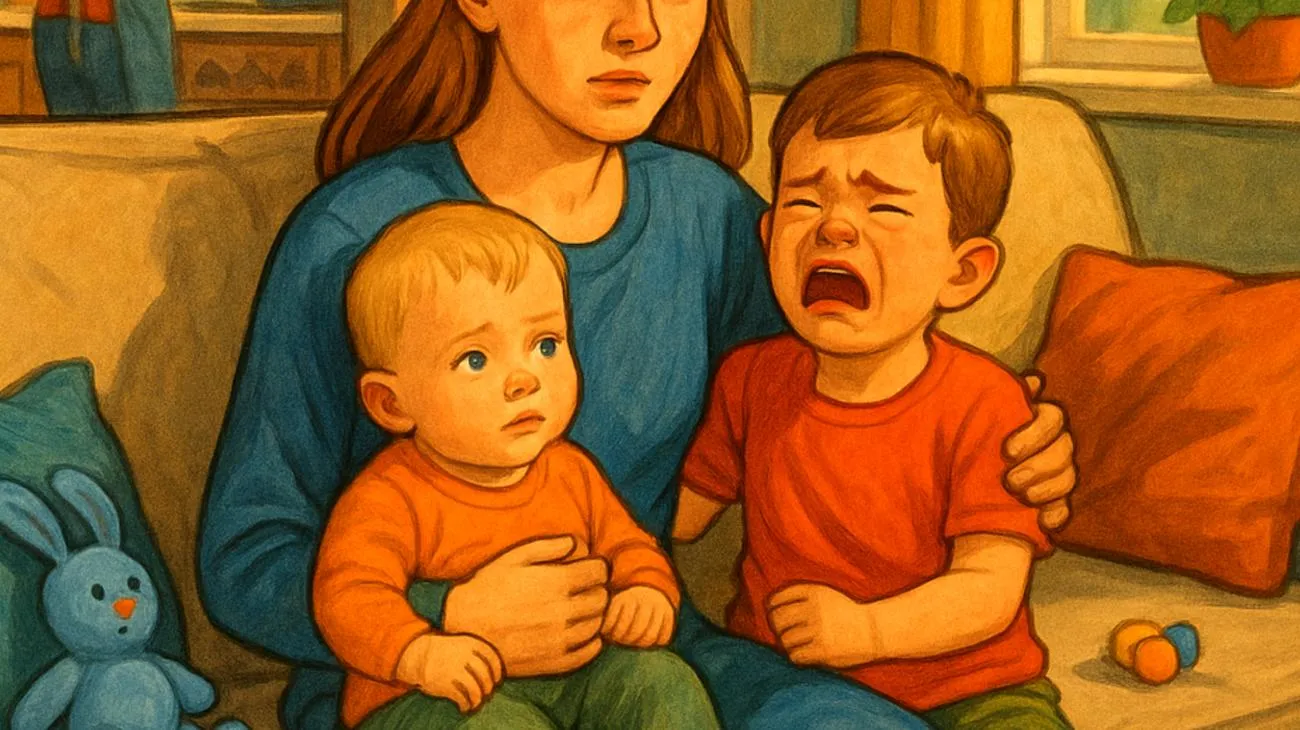You know that feeling when you’re the oldest daughter and somehow became the family’s unofficial CEO before you even hit puberty? Well, congratulations – you might be dealing with what mental health experts are buzzing about these days: eldest daughter syndrome. And spoiler alert: it’s way more serious than just being the “responsible one” in the family WhatsApp group.
What Actually Is Eldest Daughter Syndrome?
Let’s get one thing straight right off the bat: eldest daughter syndrome isn’t an official diagnosis, but that doesn’t make it any less real for the millions of women nodding their heads right now. Think of it like that universal experience of losing your keys – just because it’s not in the medical books doesn’t mean it’s not ruining your day.
This phenomenon describes the emotional labor and disproportionate pressure that gets dumped on firstborn girls. We’re talking about little girls who suddenly find themselves running family operations like tiny CEOs in sparkly shoes, mediating sibling fights, and basically becoming assistant parents without anyone asking if they wanted the job.
Here in the UAE, where families often blend traditional values with modern lifestyles, this phenomenon hits different. Many eldest daughters find themselves caught between cultural expectations of family duty and contemporary ideas about personal independence. It’s like trying to juggle flaming torches while riding a unicycle – impressive, but probably not sustainable long-term.
The Psychology Behind This Madness
So why does this happen, and why specifically to daughters? The answer is a wild cocktail of birth order psychology, cultural gender roles, and family dynamics that would make your head spin faster than a Dubai Mall fountain show.
Alfred Adler, the psychologist who basically invented birth order theory, talked about something called “dethronement” – that moment when the eldest child goes from being the center of the universe to sharing the spotlight with a screaming, attention-hogging newcomer. But here’s where it gets interesting: daughters often face additional expectations that their brothers mysteriously avoid.
Recent research by Dr. Deshna Chatterjee highlights how these early experiences create lasting impacts on self-worth, anxiety levels, and identity formation. When a young girl consistently hears “you’re so mature for your age” and “such a good helper,” she learns that her value depends on taking care of everyone else. It’s like being cast in a play you never auditioned for, and then being told the show must go on for the rest of your life.
In many families across the Emirates – whether they’re Emirati, expat, or from the diverse communities that call this region home – traditional family structures often amplify these expectations. Eldest daughters might find themselves translating for parents, managing younger siblings’ schedules, and even handling family finances before they’ve figured out their own career plans.
The Red Flags That Hit Way Too Close to Home
Charlie Health, a mental health organization that specializes in young adults, has identified several warning signs that eldest daughters commonly experience. These aren’t just personality quirks – they’re legitimate psychological responses to years of carrying responsibilities that would make a seasoned project manager break out in stress hives.
- The Perfectionism Prison: When you’ve been the “good example” since childhood, making mistakes feels like a personal apocalypse. These women develop an internal critic that makes Gordon Ramsay look gentle.
- Boundary Issues That Would Make a Geography Teacher Cry: If you’ve never been allowed to say “no” to family responsibilities, learning adult boundaries feels like trying to speak Martian.
- Chronic Over-Responsibility That Never Ends: That nagging feeling that everything is somehow your fault or your problem to solve? That’s a learned response from years of being held accountable for things completely outside your control.
- People-Pleasing on Expert Level: When your childhood role required keeping everyone happy and harmonious, adult relationships become exhausting performances.
Why This Is Actually Dangerous (Not Just Annoying)
Here’s where things get genuinely concerning, and why mental health professionals are taking this phenomenon seriously. What looks like positive traits – being responsible, caring, organized – can actually mask some pretty significant psychological challenges that affect millions of women worldwide.
Research consistently shows that parentification – the technical term for when children are forced into adult roles – strongly correlates with anxiety, depression, and chronic stress in adulthood. It’s not just about being stressed sometimes; we’re talking about nervous systems that learned to operate in constant emergency mode, like having a car alarm that never stops going off.
The danger extends beyond individual suffering. Women who experienced eldest daughter syndrome often unconsciously recreate these patterns with their own children, creating what psychologists call intergenerational transmission of family roles. It’s like passing down a cursed family heirloom that nobody wants but everyone feels obligated to keep.
In the UAE’s multicultural environment, this becomes even more complex. Many families navigate between maintaining cultural traditions and adapting to modern realities, often leaving eldest daughters caught in the middle. They might face pressure to be successful, independent professionals while simultaneously being dutiful family caretakers – a balancing act that would challenge even the most skilled circus performer.
The Anxiety Time Bomb
Mental health professionals are particularly worried about the anxiety component of eldest daughter syndrome. When children are consistently placed in situations beyond their developmental capacity, their nervous systems learn to operate in hypervigilance mode. This can manifest as generalized anxiety disorder, panic attacks, or that persistent feeling that disaster is always lurking around the corner.
The perfectionism that accompanies this syndrome isn’t just about wanting to excel – it’s about genuine terror of the consequences of not being “good enough.” When your childhood taught you that family stability depended on your performance, adult mistakes can trigger shame and anxiety responses that seem completely disproportionate to the situation.
How It Destroys Relationships (The Plot Twist Nobody Saw Coming)
Perhaps the most heartbreaking aspect of eldest daughter syndrome is how it sabotages adult relationships. These women become experts at giving support but terrible at receiving it, like having a phone that can only make outgoing calls.
In romantic relationships, this manifests as constantly managing their partner’s emotions, taking responsibility for relationship problems that aren’t theirs, or feeling guilty when they have needs of their own. It’s like being perpetually cast as the relationship therapist but never getting to be the patient who receives care and attention.
Friendships suffer too, often in subtle ways. When you’ve learned that your value comes from what you do for others, genuine intimacy becomes terrifying. These women might struggle with friends who don’t “need” them, unsure how to connect without having a problem to solve or a crisis to manage.
Breaking Free: Recognition and Recovery
The encouraging news is that recognizing these patterns represents a crucial first step toward changing them. Mental health professionals emphasize that eldest daughter syndrome isn’t a life sentence – it’s a learned response that can be unlearned with awareness, effort, and often professional support.
Therapy, particularly approaches that focus on family systems and attachment styles, can be incredibly transformative. Many women experience profound relief simply from having their experiences validated and understanding that their struggles aren’t personal failures but logical responses to their circumstances.
For families currently navigating these dynamics, awareness becomes crucial. Parents can work consciously to distribute responsibilities more equitably among all children, regardless of birth order or gender. It’s about creating family systems where everyone contributes age-appropriately, rather than placing disproportionate burdens on one child simply because they happened to be born first.
Your worth as a human being isn’t measured by how much you can do for others, how many problems you can solve, or how perfectly you can manage everyone else’s emotions. Learning to truly believe this – not just intellectually but in your bones – might just be the most important lesson of all. And for millions of eldest daughters around the world, that realization could be the beginning of a completely different, much healthier story.
Table of Contents

